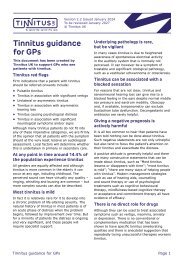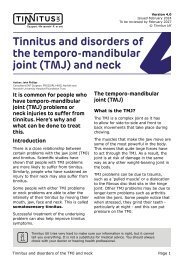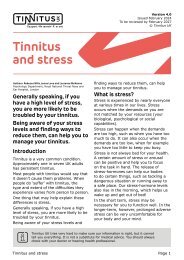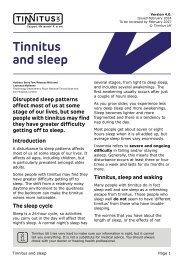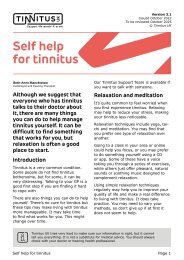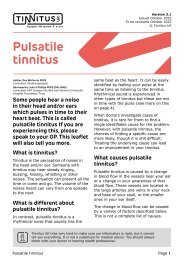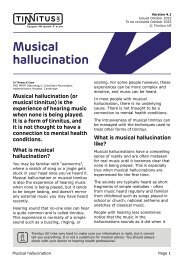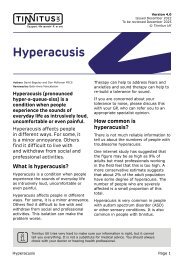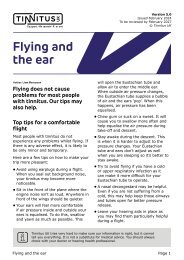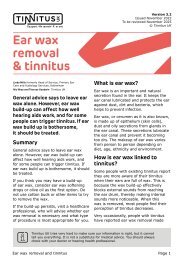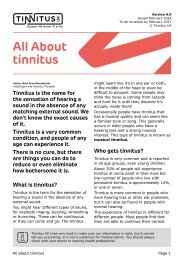Quiet - Issue 1 2022
QUIET Volume 33 ISSN: 0968-1264
QUIET Volume 33 ISSN: 0968-1264
You also want an ePaper? Increase the reach of your titles
YUMPU automatically turns print PDFs into web optimized ePapers that Google loves.
QUIET<br />
Volume 33 <strong>2022</strong><br />
QUIET Volume 33 <strong>2022</strong> www.tinnitus.org.uk 1
Thank you to our Corporate Members for their support<br />
AfterShokz<br />
Autifony Therapeutics<br />
Limited<br />
CAuRES Hearing<br />
Aid Solutions<br />
EarDial<br />
Harley Street<br />
Hearing<br />
Hear Pure and<br />
Wellbeing<br />
Holland<br />
Doctors of<br />
Audiology<br />
M C Hearing<br />
Oto Health Ltd<br />
Smiths<br />
Hearing<br />
Care Ltd<br />
The<br />
Hearing<br />
Coach<br />
Widex UK Ltd<br />
Gloucestershire<br />
Hospitals NHS<br />
Foundation Trust<br />
Sandwell and West<br />
Birmingham Hospitals<br />
NHS Trust<br />
Always Ear<br />
Better<br />
Hearing<br />
Clinic<br />
Chippendale<br />
Hearing<br />
Geraint Davies<br />
Hearing Ltd<br />
Hear Again<br />
Limited<br />
Hear We Care<br />
I am Ear<br />
Neuromod<br />
Devices Ltd<br />
Peter Byrom<br />
Audiology Ltd<br />
Snugs<br />
Earphones Ltd<br />
The Invisible<br />
Hearing<br />
Clinic<br />
Hospital<br />
services<br />
Nobles Hospital<br />
Isle of Man<br />
John Radcliffe<br />
Hospital<br />
(Oxford University Hospitals<br />
NHS Foundation Trust)<br />
AngliEAR Hearing &<br />
Tinnitus Solutions<br />
Bollington Hearing<br />
Centre<br />
Cubex Ltd<br />
Guymark UK<br />
Limited<br />
Hearbase<br />
Help in<br />
Hearing Ltd<br />
Isabella Fisher<br />
Independent<br />
Hearing Care<br />
North East<br />
Hearing and<br />
Balance<br />
Pinpoint<br />
Sound Matters<br />
The Outside Clinic<br />
Barnsley Hospital NHS<br />
Foundation Trust<br />
Royal Berkshire NHS<br />
Foundation Trust<br />
University Hospitals<br />
Bristol and Weston<br />
NHS Foundation Trust<br />
Audiological<br />
Science<br />
British Academy<br />
of Audiology<br />
Diane<br />
Hammond<br />
Independent<br />
Audiologist<br />
Halo<br />
Hearing<br />
Solutions<br />
Hearing<br />
Power<br />
Hidden Hearing<br />
Isle of Man<br />
Hearing Solutions<br />
Nuheara<br />
Puretone Ltd<br />
Specsavers<br />
The Tinnitus<br />
and<br />
Hyperacusis<br />
Network<br />
Chesterfield Royal<br />
Hospital NHS<br />
Foundation Trust<br />
Royal Cornwall NHS<br />
Foundation Trust<br />
Worcestershire Acute<br />
Hospitals NHS Trust<br />
Audiological<br />
Specialist<br />
Care Ltd<br />
British Society<br />
of Audiology<br />
HiKent<br />
Duearity<br />
Harbeth<br />
Audio Ltd<br />
Hearing Therapy<br />
Ltd<br />
Lakeland<br />
Hearing<br />
Oticon<br />
Sivantos Ltd<br />
Starkey Hearing<br />
Technologies<br />
Tinnitus<br />
E-Programme<br />
East Kent University<br />
Hospitals NHS<br />
Foundation Trust<br />
Royal Hallamshire<br />
Hospital<br />
(Sheffield Teaching Hospitals<br />
NHS Foundation Trust)<br />
York and Scarborough<br />
Teaching Hospitals<br />
NHS Trust
Supporters 02<br />
Thank you to our Corporate Members<br />
Managing tinnitus 06<br />
Digital fatigue and tinnitus<br />
CBD gummies 17<br />
A cautionary tale<br />
Fundraising 18<br />
Virtual London Marathon<br />
Phil's Ultramarathon Challenge<br />
Easy ways to support us<br />
Real lives 22<br />
John and Jo share their stories of<br />
living with tinnitus<br />
Tinnitus support 26<br />
Specialist online support groups<br />
Web chat; Membership changes<br />
Tinnitus support group listings<br />
QUIET<br />
Volume 33 ISSN: 0968-1264<br />
Tinnitus Biobank 04<br />
The urgent need for more research<br />
Focus on hearing 09<br />
Hearing loss myths<br />
Signs of hearing loss<br />
Living through a pandemic with<br />
hearing loss<br />
Tinnitus and M.E. 14<br />
Living with chronic fatigue & tinnitus<br />
Don't throw away the wrapper! The wrapper for your magazine is<br />
now compostable with your garden waste.<br />
Contacts<br />
Our Vision:<br />
A world where no one suffers from tinnitus.<br />
Our Mission:<br />
We will drive progress towards a cure and deliver<br />
excellent support to help people living with tinnitus.<br />
tinnitus.org.uk<br />
Editor<br />
Nic Wray<br />
nic@tinnitus.org.uk<br />
Address<br />
British Tinnitus Association, Ground Floor, Unit 5, Acorn<br />
Business Park, Woodseats Close, Sheffield, S8 OTB<br />
Registered charity no: 1011145. Registered in England.<br />
Helpline<br />
0800 018 0527<br />
Whilst the British Tinnitus Association (BTA) makes every attempt to ensure the accuracy and reliability of information in this magazine,<br />
it is not a substitute for medical advice. You should always see your GP/ medical professional. Advertisements for organisations,<br />
products or services do not imply endorsement of them by the BTA. All views are those of the authors and not the BTA.
THE SOUND OF SCI<br />
The urgent need for a Tinnitus Biobank<br />
During Tinnitus Week <strong>2022</strong>, we called for the establishment of a Tinnitus<br />
Biobank to deliver a step-change in the race to find tinnitus cures.<br />
What is a biobank?<br />
A biobank is a collection of biological data<br />
which helps to inform, develop and build a<br />
picture of a health condition.<br />
Existing biobanks are of limited use as they<br />
have very little data about hearing loss and<br />
tinnitus.<br />
A Tinnitus Biobank would be developed<br />
specifically for furthering research into the<br />
condition.<br />
What do you want from the Tinnitus<br />
Biobank?<br />
The Tinnitus Biobank would have several<br />
aims, including:<br />
• finding a biomarker for tinnitus<br />
• finding an objective measure for tinnitus<br />
• categorising subtypes of tinnitus<br />
Ultimately, we hope that these will help<br />
develop a pathway to finding a cure for<br />
tinnitus.<br />
What is a biomarker?<br />
A biomarker is a naturally occurring<br />
molecule, gene or characteristic by which a<br />
particular process in the body or disease<br />
can be identified.<br />
Why do we need an objective<br />
measure?<br />
The current questionnaires used to measure<br />
tinnitus have limitations. An objective<br />
measure of tinnitus would allow future<br />
treatments to be more accurately assessed,<br />
and would ultimately confirm a 'cure'.<br />
And what is a subtype?<br />
A subtype is a special type included in a<br />
more general type. So pulsatile tinnitus<br />
4 www.tinnitus.org.uk<br />
QUIET Volume 33 <strong>2022</strong>
ENCE<br />
might be regarded as a subtype of tinnitus,<br />
for example. Researchers think there could<br />
be more of these.<br />
Is the Tinnitus Biobank going to be<br />
expensive?<br />
We believe the Tinnitus Biobank would cost<br />
about £4m to set up, which is 0.53% of the<br />
£750m that tinnitus costs the NHS each<br />
year.<br />
As we picture it, the Tinnitus Biobank would<br />
be the largest single tinnitus research<br />
project outside of pharmaceutical research.<br />
We are calling on the UK Government and<br />
research funders to fast-track their support<br />
for tinnitus research funding to establish a<br />
Tinnitus Biobank.<br />
You can also donate to our Tinnitus<br />
Research Appeal online at www.tinnitus.<br />
org.uk/donatetor over the phone on 0114<br />
250 9933.<br />
How can I get involved?<br />
You can sign up to be a potential Tinnitus<br />
Biobank participant or to be kept updated<br />
about our Tinnitus Biobank plans by visiting<br />
our website at www.tinnitus.org.uk/<br />
biobank to either be<br />
If you are interested in taking part in the<br />
biobank, you will need to be 18 or over and<br />
live in the UK.<br />
Can people who don't have tinnitus<br />
take part?<br />
Absolutely! We will be looking for people<br />
with and without tinnitus to take part in our<br />
Tinnitus Biobank.<br />
Where can I find out more?<br />
You can head to our website www.tinnitus.<br />
org.uk/biobank where you can:<br />
• listen to our podcast<br />
• watch our short animation<br />
• download our White Paper<br />
• read tinnitus stories and more.<br />
QUIET Volume 33 <strong>2022</strong> www.tinnitus.org.uk 5
Digital fatigue<br />
and tinnitus<br />
Audiologist Paul Harrison explores how to pull back the feeling of fatigue and<br />
relieve tinnitus spikes.<br />
Do you often feel a sense of exhaustion<br />
after a long day of digital meetings on<br />
Zoom? Experiencing head tension, eye ache<br />
and having spikes in your tinnitus? In short,<br />
it’s your brain’s way of telling you “Stop, it’s<br />
time for a break!”<br />
It is important to firstly normalise<br />
digital fatigue. It is a completely normal<br />
consequence of long periods of digital<br />
access. Unfortunately, people who have<br />
tinnitus struggle daily with managing their<br />
symptoms – then you throw digital fatigue<br />
into the mix! So how can we pull back that<br />
mental and physical feeling of exhaustion<br />
and relieve spikes in our tinnitus?<br />
The effects of a digital generation<br />
After the initial pandemic wave,<br />
organisations have either chosen to<br />
continue allowing staff to work remotely or<br />
have introduced a hybrid working structure.<br />
Both work methods are now a huge part<br />
of our lives, as this increasing digital<br />
generation evolves and shows no signs of<br />
stopping.<br />
The result is a nation that is now struggling<br />
to cope with high levels of digital fatigue,<br />
as we continue to access digital tools to<br />
communicate with colleagues, family and<br />
friends. Most households are now living<br />
their lives in front of their screens.<br />
Distorted viewing and strained listening are<br />
some of the many links to digital fatigue.<br />
Along with finding it harder to manage<br />
tinnitus symptoms, these additional strains<br />
can lead to a lack of sleep and higher levels<br />
of stress. Your body’s way of reacting to<br />
these physical and mental complications,<br />
caused by digital fatigue, instigates a fight<br />
or flight mode that can often trigger spikes<br />
in your tinnitus.<br />
Adapting to a new soundscape and<br />
new cases of tinnitus spikes<br />
Those with tinnitus go through what is<br />
known as a habituation process quite<br />
regularly, and new organisation structures<br />
have forced them to adapt to new working<br />
environments at home, in the office or<br />
both quickly. The result? Most are finding<br />
it difficult to cope with the effects of long<br />
6 www.tinnitus.org.uk<br />
QUIET Volume 33 <strong>2022</strong>
periods of digital meetings and tinnitus<br />
spikes and are left feeling debilitated and<br />
stretched to capacity.<br />
Learning how to make changes to<br />
tinnitus relief methods that reflect this<br />
new soundscape is vital. So, you become<br />
less aware of the louder sounds of<br />
your tinnitus spikes and your attention<br />
eventually diverts elsewhere. But what<br />
at-home methods can we implement to<br />
cope with digital fatigue, whilst managing<br />
tinnitus?<br />
6 simple tips<br />
Finding a solution that’s right for you<br />
requires some trial and error and seeing<br />
management from both sides - the digital<br />
fatigue and the tinnitus spikes. Here, I<br />
go through some brief tips that may help<br />
gain relief for both.<br />
1. Focused meditation<br />
Dedicate at least 20 minutes of your lunch<br />
break to meditate or practise yoga. Taking<br />
this time out consistently will help move<br />
the focus away from stress. Slowly you<br />
will become less aware of your spikes<br />
and tinnitus sounds. You will be able to<br />
habituate the sound.<br />
2. Take note<br />
Keeping notes of what triggers your spikes<br />
will encourage you to spend less time<br />
doing that activity, taking breaks from it or<br />
eliminating it altogether. Tinnitus spikes<br />
can be sporadic and it can be hard to<br />
pinpoint the cause. Retracing your steps<br />
and taking notes will help you to smooth<br />
out the ups and downs that come with<br />
tinnitus.<br />
For example, it can go in some way to<br />
help you to adapt the way you work – like<br />
managing screen time more successfully<br />
and setting break times using your<br />
mobile’s alarm.<br />
3. Step away from your screen<br />
After a long digital meeting, you could<br />
go for a short walk outside. Fresh air and<br />
movement will improve your lymph flow,<br />
connect your muscles, improve your<br />
posture, boost your mood and reduce<br />
stress levels.<br />
4. Get your sleep back on track<br />
As a tinnitus sufferer, you know how<br />
important it is to have a good night’s sleep<br />
and recoup from the challenges of the<br />
day. It is the same for digital fatigue: you<br />
need to rest from the digital exposure and<br />
gain some control.<br />
QUIET Volume 33 <strong>2022</strong> www.tinnitus.org.uk 7
A strict bedtime and stopping using a<br />
screen an hour before you sleep will enable<br />
you to winddown.<br />
5. Consider hearing aids<br />
Because tinnitus and hearing loss are<br />
commonly linked, hearing aids might<br />
be considered. Hearing aids reduce<br />
background noise whilst offering tinnitus<br />
therapies and support to combat symptoms<br />
in realtime.<br />
Being able to stream audio straight to your<br />
ears via these devices can also support you<br />
in your online meetings and reduce the risk<br />
of digital fatigue.<br />
6. Switch your focus<br />
To distract you from your tinnitus spikes,<br />
use tinnitus apps, white noise therapies and<br />
other audio to reduce the background noise<br />
of the loud sounds. Create your own playlist<br />
that can support you while you work as well<br />
as helping to increase your concentration<br />
levels.<br />
Finding a relief strategy to suit you and your<br />
tinnitus symptoms will take time. Mixing<br />
meditation, limiting screen time, using<br />
the right tinnitus app and exercising more<br />
might be the combination for you. If you<br />
are disciplined and stick at it, you can get<br />
your life back on track and simply know<br />
how to cope better in the moment – with<br />
both digital fatigue and those unforgiving<br />
tinnitus spikes.<br />
8 www.tinnitus.org.uk<br />
QUIET Volume 33 <strong>2022</strong>
Dispelling myths about<br />
HEARING LOSS<br />
Nic Wray, BTA Communications Manager, separates fact from fiction<br />
Hearing loss can be a sensitive topic, not<br />
least because it feels scary. But the more<br />
you know, the easier it is to live with it.<br />
Here, I hope to look at some of the myths<br />
and misconceptions around hearing loss,<br />
and set the record straight.<br />
MYTH: Hearing aids will make my<br />
tinnitus louder<br />
The opposite is in fact true: this is the most<br />
common - and one of the most effective -<br />
treatment for people who have tinnitus with<br />
hearing loss.<br />
MYTH: Only old people have<br />
hearing loss<br />
One in five adults in the UK have hearing<br />
loss. Of these, more than 3 million are aged<br />
under 60, and there are 50,000 children<br />
with hearing loss.<br />
MYTH: Hearing loss isn't a big<br />
problem Untreated hearing loss can<br />
also increase your risk of cognitive decline,<br />
dementia and Alzheimer's, social isolation<br />
and depression.<br />
MYTH: Only very loud noises<br />
cause hearing loss<br />
Prolonged exposure to even moderately<br />
loud noises can damage your hearing.<br />
MYTH: I'd know if I had hearing<br />
loss<br />
Hearing loss can develop so gradually, it<br />
may take you a long time to realise you are<br />
experiencing it.<br />
MYTH: I don't need a hearing aid,<br />
I'll just turn up the volume<br />
Turning up the volume - or asking people to<br />
speak up - often distorts sounds, making it<br />
even harder to hear correctly.<br />
MYTH: Hearing loss is inevitable,<br />
especially with age<br />
Hearing loss has many causes, including<br />
genetics, some medications, smoking,<br />
diabetes and exposure to loud noises. Noise<br />
exposure is the most preventable cause of<br />
hearing loss.<br />
MYTH: Hearing aids won't help<br />
Hearing aids work for almost everyone, but<br />
only if you use the right technology with the<br />
right settings. An audiologist will take the<br />
time to get these things correct.<br />
MYTH: I don't need hearing aids<br />
yet, I can cope fine<br />
It is easy to dismiss a mild hearing loss as<br />
unimportant, but it can still have an impact<br />
on your cognitive abilities, work, home and<br />
social life. The longer you wait, the harder<br />
your hearing loss will be to treat.<br />
QUIET Volume 33 <strong>2022</strong> www.tinnitus.org.uk 9
Signs of hearing loss<br />
Audiologist - and BTA volunteer - Therese Goodwin describes how you might<br />
notice hearing loss and what you can do about it.<br />
Imagine the scene. You’re meeting a friend<br />
in your local café. You’re enjoying her<br />
company, yet you notice you’re missing<br />
parts of the conversation and you wonder<br />
why your friend is mumbling! It’s becoming<br />
a strain to hear every word and instead of<br />
asking her to repeat, you nod your head,<br />
pretending to hear, trying to fill in the<br />
gaps. Not only are you feeling frustrated<br />
and a little embarrassed, but you’re also<br />
exhausted! Does this sound familiar?<br />
According to the RNID, hearing loss affects<br />
1 in 5 adults in the UK; however, it often<br />
creeps up on us, slowly and insidiously.<br />
Like all change, it’s something we’d rather<br />
not confront, preferring to blame external<br />
events for our difficulties: the noisy<br />
restaurant, friends and family not speaking<br />
clearly enough, etc.<br />
Although rare, if you have lost hearing<br />
suddenly in one or both ears, you should<br />
contact your GP immediately.<br />
Signs of an issue<br />
We all have some difficulty hearing from<br />
time to time, but how do you know if you<br />
have a hearing loss? Here is a list of red<br />
flags that may indicate a problem within<br />
your auditory system.
What you can do<br />
If you recognise more than one or two<br />
of these signs, it’s a good idea to have<br />
your hearing tested. You’ll need to make<br />
an appointment with your GP, who will<br />
examine your ears, check for any obvious<br />
explanations for your difficulties (such as<br />
a build-up of ear wax) and if suitable, refer<br />
you to your local audiology department.<br />
Here, you’ll have your hearing tested by an<br />
audiologist, who will explain your results<br />
and if appropriate, prescribe hearing aids,<br />
which you can either obtain from the NHS<br />
or you may choose to see a private hearing<br />
aid dispenser. Not only can hearing aids<br />
make listening easier, they can also be<br />
very effective in minimising the sounds of<br />
tinnitus that often accompany hearing loss.<br />
Due to the pandemic, it may take some<br />
time before you receive your appointment<br />
with the audiologist. In the meantime, there<br />
are several helpful strategies to try.<br />
For example:<br />
• Let others know you have trouble hearing<br />
• Try to face the speaker, if possible and<br />
ask them to speak a little more slowly<br />
• Always have a small notebook and pen<br />
so you can write down important<br />
information<br />
• The use of subtitles on the TV can be<br />
enormously helpful<br />
• Consider joining a lipreading class either<br />
in person or online.<br />
Above all, if you suspect you have a hearing<br />
impairment, don’t delay. The sooner you<br />
seek help, the easier it will be to manage<br />
the problem, which will undoubtedly make<br />
listening much, much easier!<br />
Resources<br />
Whether you're new to hearing loss<br />
or have had it for many years there<br />
are resources available to help. Your<br />
audiologist can answer any questions,<br />
but these charities also offer support.<br />
AbilityNet<br />
AbilityNet supports anyone living with a<br />
disablity or impairment to use technology<br />
to achieve their goals at home, at work<br />
and in education.<br />
W: abilitynet.org.uk<br />
T: 0800 048 7642<br />
ATLA (Association of Teachers<br />
of Lipreading to Adults)<br />
ATLA's aim is to create a world where<br />
lipreading classes are available to<br />
anyone who needs them.<br />
W: atlalipreading.org.uk<br />
Hearing Dogs for Deaf People<br />
Hearing Dogs provide tailored help and<br />
support for people with all levels of<br />
hearing and their individual needs.<br />
W: hearingdogs.org.uk<br />
National Association of<br />
Deafened People (NADP)<br />
A main objective of NADP is to increase<br />
awareness of the specific needs and<br />
requirements of deafened people.<br />
W: nadp.org.uk<br />
SMS: 07818 132961<br />
RNID (formerly Action on Hearing Loss)<br />
RNID work to make life fully inclusive for<br />
deaf people and those with hearing loss<br />
or tinnitus.<br />
W: rnid.org.uk<br />
T: 0808 808 0123<br />
QUIET Volume 33 <strong>2022</strong> www.tinnitus.org.uk 11
Living through a pandemic with<br />
hearing loss<br />
Covid-19 has changed all our lives, but for<br />
people with hearing impairment, the ‘new<br />
normal’ has brought unique challenges.<br />
Researchers at Hearing Sciences – Scottish<br />
Section in Glasgow (part of the University of<br />
Nottingham), ran a study which found face<br />
masks, social distancing and video calling<br />
can be difficult for people with hearing loss,<br />
and many of those who suffer from tinnitus<br />
said it was worse during the lockdown.<br />
Four Patient and Public Involvement<br />
Representatives at Hearing Sciences –<br />
Scottish Section reflected on living through<br />
a pandemic with hearing loss:<br />
"Lockdown has been a challenge in so<br />
many ways."<br />
"During these times, it is difficult for<br />
most people, but for those with hearing<br />
difficulties it has added problems which<br />
most people do not realise."<br />
"Keeping in touch with friends was<br />
absolutely essential during this<br />
period of restrictions."<br />
"As a family, we use Zoom and Facetime a<br />
lot for wee get togethers but I find it very<br />
tiring and stressful if there are too many<br />
participants and when trying to listen in<br />
over lots of chatter and background noise.<br />
I have now had several job interviews over<br />
Zoom as well. A strange set up! Again, quite<br />
stressful trying to hear clearly."<br />
"Once lockdown restrictions had<br />
eased, I cautiously ventured out<br />
again."<br />
"Due to social distancing I am finding<br />
12 www.tinnitus.org.uk<br />
QUIET Volume 33 <strong>2022</strong>
"In general, people now seem delighted<br />
to say that there is light at the end of the<br />
tunnel and that things will be returning to<br />
normal in the not too distant future. Whilst<br />
that is indeed laudable, for those with<br />
acute loss the world around about them will<br />
not alter significantly with regard to their<br />
hearing. We need to understand this and<br />
take care of one another."<br />
If you would like to read more about the<br />
study, you can read the discussion at<br />
https://bit.ly/Q1Hearing<br />
it difficult to converse with people who<br />
are standing further away from me than<br />
normal. If they are wearing a mask this<br />
adds to the problem and for the most<br />
part I cannot hear what they are saying.<br />
Their voice is just a mumble of words that<br />
I do not hear. Masks also take away the<br />
opportunity to lip read. This has had an<br />
impact on my life and has taken away a<br />
lot of my confidence when I meet people<br />
outside my home."<br />
Written by Fiona Mowat, Rita Rivero, Morag<br />
Sievwright, and Derek Macfadyen, Patient and<br />
Public Involvement representatives and Louise<br />
Burke, Research Assistant and Patient and Public<br />
Involvement Facilitator at Hearing Sciences –<br />
Scottish Section.<br />
"Then face masks became<br />
mandatory. Another trial if you wore<br />
hearing aids."<br />
"I’ve ended up with packets of sugar, 'this<br />
week’s special coffee' and extra milk at<br />
Costa because I’ve given up asking the<br />
barista to repeat what they just said, and<br />
so I just nod. When I finally get my tray<br />
and make may way to the table to meet<br />
my friend, it’s with huge relief that I put<br />
down my tray and remove my face mask.<br />
What was that, pinging across the table<br />
and hitting her coffee mug? Oh, it was my<br />
hearing aid, once again dislodged by the<br />
mask."<br />
Register your interest at<br />
www.tinnitus.org.uk/<br />
annual-conference-<strong>2022</strong><br />
"Light at the end of the tunnel."<br />
www.tinnitus.org.uk<br />
13
Myalgic Encephalomyelitis<br />
and tinnitus<br />
People with tinnitus are often living with<br />
other health conditions, and wonder if they<br />
are connected. Here, we look at Myalgic<br />
Encephalomyelitus with Jayne Taylor,<br />
Communications and Engagement Officer<br />
from Action for M.E.<br />
M.E. (Myalgic Encephalomyelitis) received<br />
a lot of bad press in the 1980s. The<br />
inaccurate – and offensive – phrase 'Yuppie<br />
Flu', used by many of the tabloids at the<br />
time, wasn’t helping the thousands of<br />
people in the UK living with this debilitating<br />
illness. Forward more than 30 years and<br />
thankfully the tide has changed and<br />
research into the condition is gaining<br />
momentum.<br />
What is M.E.?<br />
M.E., also known as CFS (Chronic Fatigue<br />
Syndrome), is a long-term, fluctuating,<br />
neurological condition that causes<br />
symptoms affecting many body systems,<br />
more commonly the nervous and immune<br />
systems.<br />
M.E. affects an estimated 250,000 people<br />
in the UK, and around 17 million people<br />
worldwide.<br />
People with M.E. experience debilitating<br />
pain, fatigue and a range of other<br />
symptoms associated with post-exertional<br />
malaise, the body and brain’s inability<br />
to recover after expending even small<br />
amounts of energy. Additional symptoms<br />
include cognitive difficulties (also known<br />
as 'brain fog'), digestive problems and<br />
hypersensitivity.<br />
People with M.E. can vary enormously in<br />
their experience of the illness, and also how<br />
long their symptoms last.<br />
Causes of M.E.<br />
There is much debate about its underlying<br />
cause. Current theories about the cause<br />
of M.E. include autoimmune deficiencies,<br />
viral infections, autonomic/ sympathetic/<br />
central nervous system dysfunction and<br />
genetic factors, amongst others.<br />
Post-viral infection appears to be a<br />
common cause of M.E. The pandemic has<br />
highlighted the need for more research into<br />
post-viral infections, with an estimated 1.5<br />
million people in the UK experiencing selfreported<br />
long Covid symptoms following<br />
Covid 19 infection.<br />
According to the BMJ, patients with long<br />
Covid who have experienced chronic<br />
fatigue for six or more months, along with<br />
other mandatory symptoms, are likely to be<br />
diagnosed as having M.E.<br />
14 www.tinnitus.org.uk<br />
QUIET Volume 33 <strong>2022</strong>
Treatments<br />
While there is no single medicine that cures<br />
M.E., there are a number of approaches that<br />
might help people manage their symptoms.<br />
Tinnitus and M.E.<br />
There’s very little information about living<br />
with M.E. and tinnitus, but a poll conducted<br />
on the Science for ME forum suggests that<br />
about 80% of people living with M.E./CFS<br />
have experienced tinnitus.<br />
In a 2001 Belgian study of 2073 patients<br />
who met either the Fukuda or Holmes (CDC)<br />
criteria for a diagnosis of CFS found that<br />
48.5% of patients meeting the Fukuda<br />
criteria and 52.1% of patients meeting the<br />
Holmes (CDC) criteria reported tinnitus. In<br />
the general population, this figure is around<br />
30%.<br />
A more recent study from the Netherlands,<br />
looking at over 167,000 people, has<br />
identified associations between tinnitus<br />
and a number of functional somatic<br />
syndromes, including fibromyalgia and CFS.<br />
People with CFS were 22% more likely to<br />
experience tinnitus than those without.<br />
More research is needed to identify if<br />
tinnitus and these syndromes have<br />
underlying mechanisms in common.<br />
• Pacing is a methodical approach to<br />
balancing activity and rest, with the<br />
aim of bringing about more stability in<br />
symptoms.<br />
• Eating healthily is important, and many<br />
people with M.E. opt for unprocessed<br />
foods and avoid (or reduce) sugar,<br />
caffeine and alcohol.<br />
• Sleep and pain management can be<br />
achieved through a variety of ways<br />
including medication such as tablets or<br />
patches.<br />
• Complementary approaches such as<br />
massage, reiki and acupuncture may be<br />
helpful. Good quality published evidence<br />
can vary considerably for each therapy.<br />
Note: Strenuous exercise is not<br />
recommended for people with M.E. The<br />
NICE guideline for M.E. says people with M.E.<br />
should not be offered any therapy based on<br />
physical activity or exercise as a cure.<br />
M.E. support<br />
M.E. can leave many people housebound<br />
and feeling isolated.<br />
Action for M.E. offers free UK-wide support,<br />
information, signposting and advocacy<br />
about any aspect of M.E. alongside doctor,<br />
physiotherapy, counselling and chaplaincy<br />
services (these are subject to a charge;<br />
bursaries are available).<br />
Call: 0117 927 9551<br />
Email: questions@actionforme.org.uk<br />
Website: www.actionforme.org.uk<br />
QUIET Volume 33 <strong>2022</strong> www.tinnitus.org.uk 15
LIVING WITH M.E.<br />
Jules shares how she manages living with both M.E and tinnitus.<br />
My first symptoms of M.E. appeared after I had<br />
glandular fever and whooping cough one after<br />
the other in 1982. I also suffered an extreme<br />
emotional trauma that year and I think my<br />
body just couldn’t cope and was overwhelmed.<br />
Relieved to finally have a label<br />
In 1999, I had a knee operation that caused nerve<br />
damage and that was the real beginning of my<br />
more severe M.E. and I was finally diagnosed in<br />
2014! I cried when the specialist gave me the<br />
diagnosis, not because I was unhappy, but because<br />
I was relieved to finally have a label.<br />
I now have moderate to severe M.E. where even the<br />
simplest task can leave me bedbound for days.<br />
A constant ringing<br />
I honestly can’t recall when I first noticed the<br />
tinnitus. I know I used to visit clubs and concerts in<br />
the 1980s and often had sporadic tinnitus but that<br />
was 'normal' back then. It only really became a<br />
problem in the last five years with a constant<br />
ringing/whistle. I have always suffered with ear<br />
infections and my hearing is now affected when I<br />
am in a busy location.<br />
Seems worse in quiet places<br />
I didn’t really connect my M.E. and my tinnitus,<br />
they are both just something I live with but I<br />
haven’t really related the two. My tinnitus is<br />
constant so I don’t think it is triggered by anything<br />
anymore. I know it used to be loud environments<br />
and tiredness, and now it sometimes seems worse<br />
in quiet places when I am tired or stressed.<br />
My M.E. is also worse when I am tired and stressed<br />
or when I have an accelerated heart rate. By that I<br />
mean every time I move, breathe, make a cup of<br />
tea or attempt a bath.<br />
Jules<br />
Life in general triggers my M.E.<br />
Life in general triggers my M.E. and can leave me<br />
bedbound while I recover. I had to give up work as I<br />
just couldn’t manage my symptoms while I was<br />
working.<br />
I have found Audible (an online audiobook service<br />
from Amazon) really helpful at night for tinnitus.<br />
Listening to anything really. I have 'sleep<br />
headphones' that allow me to fall asleep whilst<br />
listening. I can’t fall asleep in silence as my brain is<br />
never silent.<br />
Living my life as well as I can<br />
During Covid-19 I thought my M.E. would improve.<br />
Being in lockdown and totally isolated, I figured my<br />
symptoms would ease. However, that wasn’t the<br />
case and not having contact with friends and<br />
family made my mental health worse which in turn<br />
exacerbated my M.E. Now I try to limit stress and<br />
physical exertion but balance that with living my<br />
life as well as I can.<br />
16 www.tinnitus.org.uk<br />
QUIET Volume 33 <strong>2022</strong>
CBD gummies:<br />
a cautionary tale<br />
We strongly suggest avoiding CBD<br />
gummies and their sellers. As well as there<br />
being no evidence for their effectiveness,<br />
we were aware that some people were<br />
paying more than they expected. Nic Wray<br />
spoke to one such person.<br />
Retiree Rosemary had recently been<br />
diagnosed with tinnitus and it was causing<br />
her some distress. Looking on the internet<br />
for help, she saw a website in America<br />
which claimed it was supported by the<br />
‘dragons’ from the TV programme Dragons'<br />
Den. She decided to purchase some CBD<br />
soft gels for £40.<br />
After she’d entered her card details, a popup<br />
offered pain relief ‘gummy bears’ and<br />
Rosemary couldn’t see a way of rejecting it.<br />
On the next screen, her order was instantly<br />
completed, and declared that not only had<br />
she ordered gummy bears for £38.99, but<br />
also the main order had been £198.78, not<br />
£40, meaning the order total was £237.77!<br />
“I am a pensioner and there was no way<br />
that I would have wanted to spend that<br />
much money on a product I had not even<br />
tried!”<br />
After immediately contacting her bank,<br />
Rosemary learned that the payment had<br />
already been taken.<br />
She then contacted the vendor. They<br />
initially said they could not cancel the order<br />
as it had already been shipped but after<br />
insisting, the company reluctantly agreed<br />
to refund £38.99 and a further $70. If she<br />
returned the product on arrival, she would<br />
receive a refund in two instalments, less an<br />
administration fee of $70, and pay postage<br />
herself.<br />
After talking to the vendor, Rosemary<br />
noticed three further charges to her card,<br />
and an email saying she had been enrolled<br />
in an e-book syndicate.<br />
The Fraud Department of Rosemary’s bank<br />
is now involved in the case and her debit<br />
card has been cancelled.<br />
If you have fallen for a fake celebrity CBD<br />
brand scam, you must contact your bank or<br />
credit card company straight away. They<br />
will tell you if it is possible to claim your<br />
money back.<br />
Rosemary says, “I feel such a fool. I am<br />
pleased to have found the BTA and your<br />
website and hope I can learn more which<br />
will help me in the future.”<br />
Dragons' Den and the celebrities from the<br />
programme are in no way involved in the<br />
manufacture and selling of CBD gummies.<br />
QUIET Volume 33 <strong>2022</strong> www.tinnitus.org.uk 17
The virtual London<br />
It was a celebration of everything the<br />
London Marathon stands for: fun,<br />
fundraising, fancy-dress and amazing<br />
community spirit, and a triumph of<br />
positivity and togetherness.<br />
Our wonderful Team BTA 2021 raised over<br />
£16,000 and have some amazing<br />
memories from the event.<br />
Are you interested in joining our<br />
<strong>2022</strong> marathon dream team?<br />
The virtual London marathon is<br />
back for a third year!<br />
We’ve secured 10 places for this year’s<br />
event and if you’re keen to get involved,<br />
we’d love you to be part of our team.<br />
The 41st London Marathon on Sunday 3<br />
October 2021 was the biggest marathon<br />
ever staged anywhere in the world: with<br />
22,342 people from more than 101<br />
countries taking on the 26.2 miles virtually<br />
and 35,871 participants back on the<br />
traditional central London course.<br />
By taking part in the <strong>2022</strong> event, you'll be<br />
one of 50,000 to complete the virtual<br />
marathon and one of 10 to do it for our<br />
charity and the tinnitus community. You’ll<br />
have 24 hours to complete the 26.2 miles.<br />
You decide your route, start time and even if<br />
you walk or run!<br />
Event details<br />
Date: 2 October <strong>2022</strong><br />
Distance: 26.2 miles<br />
Location: Anywhere!<br />
Entry fee: £28 (£35 overseas runners)<br />
Suggested minimum sponsorship: £260<br />
(£10 for every mile!)<br />
L-R: Louise, Angela, Colette, Richard, Hugo, Helen, Jess, Chloe and Stephan, Neal, Jo and Christina<br />
18 www.tinnitus.org.uk<br />
QUIET Volume 33 <strong>2022</strong>
marathon is back!<br />
What you will receive<br />
• A BTA t-shirt/running vest<br />
• Access to the Official London Marathon<br />
app to log your 26.2 miles<br />
• Personalised fundraising support from a<br />
dedicated BTA fundraiser<br />
• Lots of encouragement, help and advice<br />
• An official London Marathon finishers<br />
medal and t-shirt<br />
• An invite to our BTA London Marathon<br />
team celebration<br />
To find out more and apply for one of our<br />
virtual London Marathon places, please<br />
email fundraising@tinnitus.org.uk<br />
Already have a place?<br />
If you were able to secure a place in the<br />
in-person or Virtual London Marathon, we'd<br />
love to help you fundraise for the BTA. As<br />
you have your own place, there is no<br />
minimum sponsorship AND you still receive<br />
personalised fundraising support.<br />
Contact our team on fundraising@tinnitus.<br />
org.uk<br />
Challenge<br />
events near you<br />
From 5ks to marathons, we have<br />
charity places in a range of<br />
events across the UK and abroad.<br />
Dedicating a personal challenge to support<br />
our work and the tinnitus community is a<br />
great way to raise awareness, and funds,<br />
amongst your friends, family and local<br />
community.<br />
As in-person events start to resume you<br />
can find a local challenge event to take part<br />
in and use our booking system to secure<br />
your place.<br />
Choose your event at www.tinnitus.org.uk/<br />
local-challenge-events<br />
Our team will be with you every step of the<br />
way, supporting you throughout your<br />
challenge and fundraising.<br />
Good luck!<br />
QUIET Volume 33 <strong>2022</strong> www.tinnitus.org.uk 19
Phil's ultramarathon<br />
challenge - times five!<br />
Phil Maull<br />
Phil Maull (52) from Folkestone has<br />
challenged himself to complete five x 50km<br />
ultramarathons this year to raise<br />
awareness and funds for our work, as his<br />
mum lives with tinnitus.<br />
Phil first started fundraising for the BTA<br />
back in 2018 when he completed his first<br />
ever marathon in Amsterdam.<br />
He shared: “I want to help the tinnitus<br />
community because my mum suffers from<br />
it so badly. She doesn’t just get hissing but<br />
drumming sounds and drilling. I know she<br />
can find it debilitating but she just carries<br />
on so well which I really admire. She has<br />
always been there for me and now it’s my<br />
turn to give something back."<br />
When asked “Why 5 x 50k ultramarathons?”,<br />
Phil replied, "Well why not? I have done<br />
some marathons previously and wanted a<br />
real challenge and this certainly is! I did my<br />
first Ultra last December and loved it. I<br />
completed it in 7 hours 15 minutes."<br />
Phil completed his first of the five<br />
ultramarathons on 5 March and achieved a<br />
new personal best (PB) of just 5 hours 41<br />
minutes –congratulations Phil!<br />
Please support Phil and<br />
help him to reach his<br />
fundraising goal by<br />
donating at justgiving.<br />
com/phil-maull or by<br />
scanning the QR code.<br />
Want to take on a fundraising<br />
challenge? Email fundraising@<br />
tinnitus.org.uk and our team will<br />
help you.<br />
20 www.tinnitus.org.uk<br />
QUIET Volume 33 <strong>2022</strong>
Make your shopping<br />
count!<br />
Have a shot at<br />
our lottery!<br />
We’re registered with easyfundraising,<br />
which means you can raise FREE donations<br />
when online shopping with over 6,000<br />
retailers, including John Lewis & Partners,<br />
Not On The High Street, Uswitch, eBay, Etsy,<br />
M&S and more!<br />
So, whether you’re buying a takeaway,<br />
presents, insurance or a holiday, you can<br />
help to raise extra funds to support our<br />
work, at no extra cost to you!<br />
It couldn’t be easier! Register online at<br />
www.easyfundraising.org.uk/causes/<br />
britishtinnitusassociation and start<br />
shopping. You can download the mobile app<br />
and install the web browser extension, so<br />
you never miss a donation.<br />
It's such an easy way to support our work<br />
for the tinnitus community, for FREE.<br />
CALLING ALL BUSINESSES! - you can<br />
support our work with your business<br />
purchases too! Retailers like Viking, Staples,<br />
Dell, thetrainline, Euroffice, Inkfactory,<br />
Booking.com, Apple, Travelodge and many<br />
more are all ready to donate (at no extra<br />
cost to your business) when you shop with<br />
easyfundraising. Go to www.<br />
easyfundraising.org.uk/register-yourbusiness<br />
“I play this lottery as I want to support<br />
the work that [the BTA] do. I think it’s<br />
very important and as a tinnitus<br />
sufferer myself, anything I can do to<br />
help research and avoid others getting<br />
this in the future I will do.”<br />
- Ben, BTA lottery player<br />
The weekly draw costs £1 per entry and if<br />
your numbers match in the right order, you<br />
win £25,000!<br />
The lottery results are calculated using the<br />
temperatures from selected destinations<br />
around Europe on a particular day each<br />
week.<br />
Register at www.tinnitus.org.uk/lottery<br />
Players must be 16 or over and must reside in Great<br />
Britain. Full Ts & Cs apply.<br />
QUIET Volume 33 <strong>2022</strong> www.tinnitus.org.uk 21
MOVING FORWARD<br />
John Cooper was sceptical that he would ever habituate and live well with his<br />
intrusive tinnitus. So how come he now co-faciliates an online support group?<br />
I won’t go into too much detail of the crisis<br />
days of my tinnitus. Suffice to say, my<br />
tinnitus started with an unexplained inner<br />
ear ‘event’. As is common to a lot of us, the<br />
onset of tinnitus had a significant negative<br />
impact on my mental health.<br />
Prior to the inner ear event, I would have<br />
considered myself a very physically and<br />
mentally healthy person who enjoyed<br />
playing sport, going to the theatre, going to<br />
festivals and generally feeling very happy<br />
and enjoying life.<br />
Huge negative impact<br />
I struggled for a long time with my tinnitus,<br />
and it had a huge negative impact on my<br />
whole life. I felt I had zero control: my<br />
nervous system was on alert 24/7 with the<br />
feeling of being constantly under attack<br />
from this noise I could not escape.<br />
There have not been many positive things<br />
to come from Covid-19, but the BTA virtual<br />
online support groups which arose from<br />
lockdown were really my first big step<br />
in moving forward to living well with my<br />
tinnitus.<br />
I was pretty sceptical<br />
I have to be honest, I was sceptical of<br />
support groups and thought, "What could<br />
they offer me, a bunch of folks sitting<br />
around (virtually) talking about their<br />
tinnitus?"<br />
John Cooper<br />
After the first session, I was still not yet<br />
a ‘believer’. In fact I was angry, as I heard<br />
several people talking about habituation<br />
and acceptance and I thought to myself,<br />
"You don’t know how bad my tinnitus is,<br />
YOU HAVE NO IDEA!"<br />
Techniques to help<br />
However, after the second session I could<br />
see that I had been far too subjective and<br />
had allowed my emotions to overtake me.<br />
As the sessions went on, I realised not only<br />
was I learning about the condition, I was<br />
also learning techniques to help me live<br />
with my tinnitus.<br />
I was also getting empathetic support<br />
from others in the tinnitus community. The<br />
sceptical me prior to my first group meeting<br />
wouldn't have believed that I was going to<br />
feel like this!<br />
22 www.tinnitus.org.uk<br />
QUIET Volume 33 <strong>2022</strong>
A sort of epiphany<br />
Prior to attending the support group, I was<br />
doing a few distraction techniques to try<br />
and help me function day to day. After<br />
one of the group sessions I had a sort of<br />
epiphany and realised that I had to manage<br />
my tinnitus rather than it managing me.<br />
I had to take back control of my life,<br />
my nervous system, my mental health,<br />
everything.<br />
Take its power away<br />
Although the distraction techniques<br />
had been useful, I realised I had to put a<br />
complete plan in place that also included<br />
what I call behavioural techniques<br />
(cognitive tools, mental health tools, etc).<br />
I realised distraction techniques were just<br />
that, a distraction from my tinnitus. What I<br />
needed to do was to stop my mind focusing<br />
on my tinnitus. I needed to take its power<br />
away, so I no longer thought about it as a<br />
threat and something to focus on.<br />
The addition of the behavioural techniques<br />
into my management plan was the<br />
springboard to really taking significant<br />
steps forward in living well with my tinnitus.<br />
Another epiphany<br />
As the groups went on and I was working<br />
on my plan, I had another epiphany which<br />
was, "I have tinnitus, it’s probably not<br />
going away, there is no cure BUT that’s<br />
okay". I think this is what some would call<br />
acceptance. This phase was massive for<br />
me, as I realised all the things I had done<br />
in my plan were working. I no longer saw<br />
my tinnitus as a threat and ultimately my<br />
tinnitus was just part of my normal life. I<br />
had normalised it and it no longer had any<br />
power over me.<br />
Try to help others<br />
As I moved forward from this phase, I<br />
reflected on the suffering I had gone<br />
through prior to putting my plan in place.<br />
This was the catalyst for me wanting to<br />
give back to the BTA, not only thanking<br />
them for helping me but to also try to help<br />
others in the tinnitus community so that<br />
they didn't suffer as I had.<br />
I began various volunteering activities<br />
for the BTA and was eventually asked<br />
to help co-facilitate one of the online<br />
support groups. It’s an honour and a great<br />
responsibility to be a Support Group Leader<br />
and I hope I serve the tinnitus community<br />
well.<br />
QUIET Volume 33 <strong>2022</strong> www.tinnitus.org.uk 23
Tinnitus is all<br />
consuming<br />
Music executive Jo Fry shares his experience of living with tinnitus<br />
I’ve had constantly ringing, very highpitched<br />
tinnitus in my left ear since around<br />
May 2020. I’ve had little episodes of it over<br />
the years, but we’re talking about 10-15<br />
seconds, which are forgotten about almost<br />
as soon as they start.<br />
I was very concerned<br />
ENT specialists have concluded that there’s<br />
probably age-related hearing loss in that<br />
ear (although I’m only 46). I work in artist<br />
management in the music industry so my<br />
hearing is rather important, to say the least.<br />
Back in May 2020, the live music business<br />
was imploding due to the lockdown, and<br />
like everyone working in the arts, I was<br />
very concerned about the future. With<br />
two young mouths to feed and bills to pay,<br />
stress became a real issue, which is why<br />
I think my tinnitus has to be connected in<br />
some way with that stress. To add to that,<br />
I also have a (non-tinnitus) issue with my<br />
other ear that remains unresolved.<br />
Ways of trying to mitigate it<br />
There are times throughout the day when I<br />
sort of forget about it. Often that coincides<br />
with outside noise, or my attention being<br />
diverted in another way. But there are also<br />
times of the day when it’s very prevalent<br />
such as last thing at night when I’m reading<br />
in bed or trying to fall asleep, so I’ve had to<br />
find ways of trying to mitigate it.<br />
Jo Fry<br />
At night, I tend to fall asleep listening to a<br />
podcast or whatever at a very low volume<br />
through an ear bud. I set a timer for 25<br />
minutes, which is usually enough for me to<br />
fall asleep to, and the ear bud also drops<br />
out. It doesn't tend to stop me sleeping<br />
once I'm asleep, but it can very much delay<br />
me from falling asleep.<br />
It’s really hard<br />
When I think about my tinnitus, and think<br />
how loud it is, it does make it louder. So,<br />
rather than do that and then end up talking<br />
to myself and looking a bit odd, I try to<br />
distract my brain from the tinnitus and try<br />
not to think about it too much. It’s really<br />
hard, especially if you’re not used to doing<br />
24 www.tinnitus.org.uk<br />
QUIET Volume 33 <strong>2022</strong>
it, and it requires a lot of brainpower or<br />
concentration.<br />
Try not to fight it<br />
Another thing I try and do is to not to<br />
fight it, even to accept it. This ringing<br />
is not going away. It really does help so<br />
much if I don't work myself up about it:<br />
subconsciously, the tinnitus becomes less<br />
prominent. All this requires some kind of<br />
discipline that I'm not used to having, so<br />
I’m still learning on that one!<br />
Playing sports and doing exercise is great<br />
because when your body is moving, what<br />
you're hearing is different. And I'm not<br />
focused on the ringing. It’s been a great<br />
relief to me.<br />
Brain trains itself not to notice<br />
I found the medical approach has been<br />
at times very helpful and at times deeply<br />
frustrating. With tinnitus, which is all<br />
consuming, you would love for someone<br />
to say, “This is what you do”. The person I<br />
saw, I have huge respect for. He was very<br />
patient and very honest with me about<br />
the fact that there isn’t a cure, but that<br />
how in many cases, the brain trains itself<br />
not to notice the sound, and that it may<br />
go away, but that it could take months<br />
or years. I’ve also had to understand that<br />
tinnitus is a symptom of something else,<br />
not a disease.<br />
There's only so much I can say to my<br />
wife and two kids about this constant<br />
noise. And they can't help me necessarily.<br />
So that's been difficult because I<br />
haven't really been able to vent to<br />
anyone, especially at first whilst we<br />
were in lockdown. They’ve been really<br />
sympathetic at times, of course, but I<br />
don't expect them to understand what I'm<br />
going through because unless you have<br />
it yourself, it's very difficult, I think, to<br />
empathise.<br />
Sometimes I worry about the future<br />
because I consider myself still 'youthful'<br />
at 46 and wasn't expecting my hearing<br />
to cause issues at this stage in my life.<br />
Rather worryingly, I am told that the<br />
ringing may never go away - which is also<br />
something hard to accept!<br />
People can be desperate<br />
While I’m open to trying anything, I like<br />
to think I wouldn’t fall for one of the (very<br />
convincing) YouTube videos or internet<br />
adverts about new tinnitus cures, but<br />
I can understand that people can be<br />
desperate enough to try them. At one<br />
point the ENT specialist did put me on a<br />
no caffeine, low salt diet but I didn't notice<br />
a dramatic change.<br />
Help each other out<br />
I wish I'd discovered the BTA a bit sooner.<br />
I always knew that tinnitus was quite<br />
prolific with many sufferers, but I used<br />
to wrongly assume that people suffer –<br />
excuse the pun - in silence. Having had<br />
this for nearly two years now, the time for<br />
suffering in silence is over.<br />
I want to be able to talk to people and<br />
say, “You know what, I've got the same<br />
and isn't it tough? Let's see if we can help<br />
each other out; here's some things that<br />
have helped me.”<br />
I think knowing there's a network of<br />
supportive people out there can be a<br />
source of great comfort. The BTA webinars<br />
and pages about potential treatments and<br />
cures are so helpful, especially with the<br />
clear and sensible traffic light system. I<br />
just wish there were a few more greens on<br />
there - maybe in time!<br />
QUIET Volume 33 <strong>2022</strong> www.tinnitus.org.uk 25
Need to talk about tinnitus?<br />
Web chat Wednesday evenings 7-9pm<br />
Membership<br />
changes<br />
Like many organisations, we have found<br />
the last two years incredibly challenging.<br />
The demand for our services has increased<br />
but unfortunately competition for funding<br />
and donations is fiercer than ever.<br />
We receive no direct Government funding<br />
for our work. And like all of you, we are not<br />
immune to the effects of rising costs and<br />
inflation.<br />
In order to support as many of the 7.1<br />
million adults living with tinnitus in the<br />
UK, we are having to make changes to our<br />
services and member benefits. This has<br />
been a very hard decision to make.<br />
Chat with our volunteers<br />
We know that sometimes people can't<br />
contact us during our main opening hours.<br />
And sometimes, people want that extra<br />
understanding that comes from talking<br />
about tinnitus with someone else who<br />
experiences it themselves.<br />
This is why, every Wednesday, our web chat<br />
service is open between 7 and 9pm and<br />
staffed by our wonderful volunteers, all of<br />
whom are living with tinnitus.<br />
The service is confidential, and free of<br />
charge. To have a web chat with one of our<br />
trained advisers, visit www.tinnitus.org.uk,<br />
using computer, tablet or mobile, and click<br />
on the speech bubble icon at the bottom of<br />
the page - it's that easy!<br />
Please note that we can't provide medical<br />
advice.<br />
Going forward, members will receive <strong>Quiet</strong><br />
in Spring each year and Our Impact in<br />
Autumn. Our FOCUS, INSPIRE and EXPLORE<br />
e-newsletters will be combined, and we will<br />
produce one e-newsletter each month.<br />
We will continue to update our social media<br />
streams on a daily basis, so you need never<br />
miss out on news, information and support.<br />
If you<br />
have any<br />
questions,<br />
please<br />
do not<br />
hesitate to<br />
contact us<br />
- details<br />
are on<br />
page 3.<br />
26 www.tinnitus.org.uk<br />
QUIET Volume 33 <strong>2022</strong>
SPECIALIST SUPPORT<br />
Although everybody's tinnitus is different, people in our online groups find that they have<br />
much in common. But sometimes, a more specialist group might be more beneficial. Why<br />
not try one of these out? Find details at www.tinnitus.org.uk/online-support-groups<br />
Tinnitus and hyperacusis<br />
Meets on the third Wednesday of the month.<br />
Hyperacusis describes when the sounds of everyday life are<br />
intrusively loud, uncomfortable and sometimes painful.<br />
This support group is for those experiencing both tinnitus and<br />
hyperacusis.<br />
Musicians<br />
Meets on the second Wednesday of the month.<br />
Following research conducted with Help Musicians, the BTA has<br />
recognised the need for a tinnitus support group for musicians.<br />
This group is aimed at: anyone with tinnitus who has worked as a<br />
professional musician; musicians with tinnitus<br />
18-30s<br />
Meets online on the fourth Monday of the month.<br />
We have found that many people with tinnitus like to speak to<br />
others of a similar age or at a similar stage in life.<br />
This group is aimed at 18-30 year olds with tinnitus, whether you're<br />
struggling or managing it well. Family members and/or friends of<br />
those attending are encouraged to join as well.<br />
Cymraeg (Welsh speaking group)<br />
Cyfarfod ar y pedwerydd dydd Mercher o bob mis<br />
Gan y bydd y cyfarfodydd yn cael eu cyflwyno yn Gymraeg, bydd<br />
angen i gyfranogwyr allu siarad a deall Cymraeg.<br />
Mae'r grŵp ar gyfer unrhyw un sy'n cael trafferth gyda'u tinitws;<br />
unrhyw un sy'n rheoli ei tinitws ac sydd am rannu awgrymiadau/<br />
cyngor ag eraill; anogir aelodau o'r teulu a/neu ffrindiau'r rhai sy'n<br />
mynychu i ymuno hefyd.<br />
QUIET Volume 33 <strong>2022</strong> www.tinnitus.org.uk 27
SUPPORT GROUPS<br />
Scotland<br />
Edinburgh & SE Scotland<br />
Forth Valley<br />
Glasgow<br />
Highlands<br />
Northern Ireland<br />
Belfast<br />
Craigavon<br />
Enniskillen<br />
Newry & Mourne<br />
Omagh<br />
RNID Northern Ireland<br />
Western (Londonderry)<br />
North-West England<br />
& Isle of Man<br />
Aintree<br />
Blackpool<br />
Bolton<br />
Cumbria<br />
Isle of Man<br />
Kendal<br />
Manchester<br />
Prestwich<br />
St Helens<br />
Stockport<br />
Widnes/Runcorn<br />
Wales<br />
Aberdare<br />
Bridgend<br />
Cardigan<br />
Dolgellau<br />
Llanelli<br />
Pontyclun<br />
Pontypridd<br />
Rhondda<br />
Swansea<br />
Ystradgynlais<br />
South-West England<br />
Bournemouth<br />
Bristol<br />
Gloucester<br />
Kingsbridge &District<br />
Mid-Somerset<br />
South West England<br />
Taunton<br />
Truro<br />
South-East England<br />
Aldershot & District<br />
Amersham<br />
Ashford, Kent<br />
Basingstoke<br />
Brighton<br />
Canterbury<br />
Crowborough<br />
Dover<br />
Faversham<br />
Harpenden<br />
Hitchin<br />
Isle of Wight<br />
Maidstone<br />
Marlow/Farnham Common<br />
Oxford<br />
Pembury (West Kent)<br />
Rochester<br />
Salisbury<br />
Southampton (on hold)<br />
Thanet<br />
West Midlands<br />
Birmingham & District<br />
Newcastle under Lyme<br />
Shrewsbury<br />
Stoke on Trent<br />
Telford<br />
Warwick<br />
Whitchurch<br />
We have tried to ensure that this<br />
listing is as accurate as possible,<br />
but please check with the Group<br />
Facilitator before setting out to<br />
an in-person meeting.<br />
Check the Support Groups<br />
Directory online at bit.ly/TSGTT<br />
or contact us on 0800 018 0527<br />
or helpline@tinnitus.org.uk.<br />
Key<br />
BTA Gold Standard group<br />
Meetings online<br />
North-East England<br />
Chester-le-Street<br />
Darlington<br />
Newcastle<br />
North Tyneside<br />
Seaham<br />
Yorkshire & Humber<br />
Bradford<br />
Brighouse<br />
Keighley<br />
Rotherham<br />
Rotherham Central<br />
Sheffield<br />
York<br />
East Midlands<br />
Chesterfield<br />
Derby<br />
Lincoln<br />
Northampton<br />
Nottingham<br />
East of England<br />
Bury St Edmunds<br />
Cambs (Cambridgeshire)<br />
Chelmsford<br />
Ipswich<br />
King's Lynn<br />
Lowestoft<br />
North East Essex<br />
Southend-on-Sea<br />
NEW!<br />
London (within M25)<br />
Bexley<br />
Boreham Wood<br />
Bromley<br />
City of Westminster NEW!<br />
Chiswick<br />
Greenwich<br />
Hornchurch<br />
Isleworth<br />
Kingston<br />
North London<br />
Orpington<br />
Redbridge & Hackney<br />
Meetings in-person<br />
Meetings on hold




